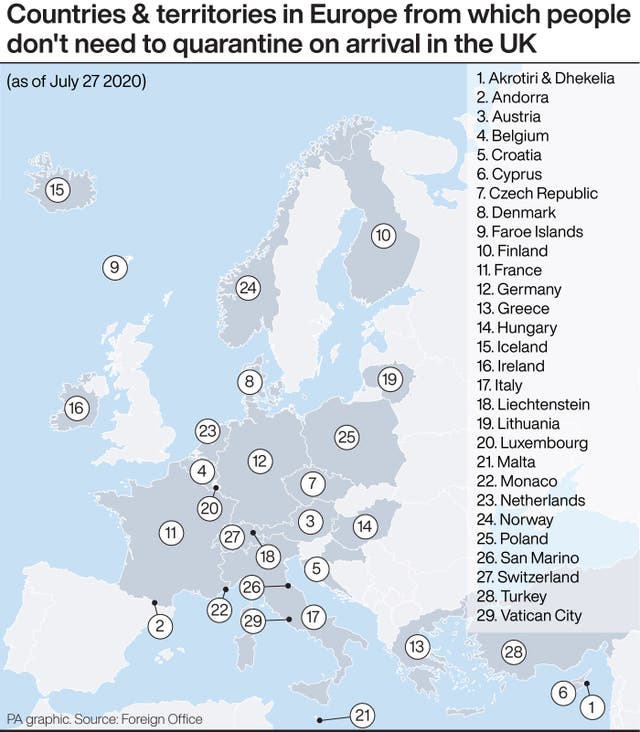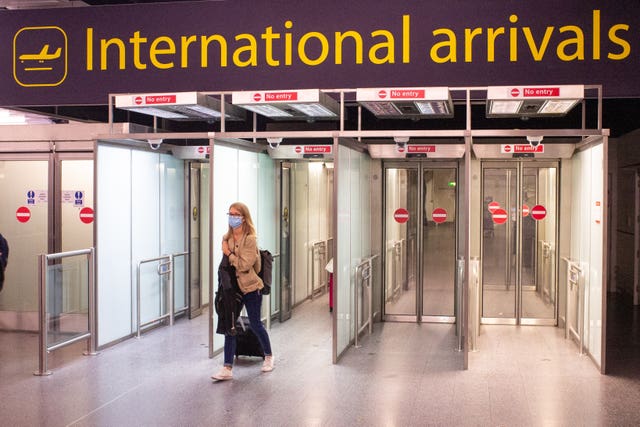Call for ‘smarter’ border checks after Spain removed from quarantine-free list
Temperature checking is among the measures proposed by Labour to replace the existing ‘blunt’ self-isolation policy.

The Government has been urged to introduce “smarter measures” at the border after holidaymakers in Spain were told they must quarantine when they return home.
Labour’s shadow home secretary Nick Thomas-Symonds said there are “serious questions” about the blanket self-isolation requirement.
He told BBC Radio 4’s Today programme: “The first is why we are still employing the… blunt tool of the 14-day quarantining rather than smarter measures, and secondly the chaotic nature of the decision-making which certainly hasn’t bred confidence in the Government’s approach.”
Mr Thomas-Symonds added: “I think you need a smarter set of quarantine measures at the airport. I’ve suggested this test, trace and isolate regime but you can also have temperature checking and other things – you look at a range of measures.”
Spain has been removed from the UK’s list of safe destinations after it saw a spike in the number of coronavirus cases.
The decision was announced on Saturday night, less than five hours before it came into force.
Andrew Flintham, managing director of TUI UK and Ireland, called for a “more nuanced policy” to include rules based on regions as well as countries.
He noted that the Foreign and Commonwealth Office is not advising against non-essential travel to Spain’s Balearic Islands, but the quarantine requirement covers arrivals from both mainland Spain and its islands.

Speaking to Sky News, Mr Flintham said: “If the Balearics are still OK to go to – and clearly the travel advice says you can travel – should we have a different quarantine or no quarantine for those and not lump it all together, as in one big total Spain quarantine?
“We’re really after a little bit of a nuance because, being honest, going forward, with something like the United States, it could be there’s a problem in Florida but not in California, and you wouldn’t want to close the whole of the United States to tourists.”
Tui has cancelled all holidays to mainland Spain up to and including August 9.
The Government’s decision to reimpose restrictions on Spain left holidaymakers frustrated, with some saying they would not have travelled if they knew they would have to spend a fortnight self-isolating afterwards.

Close to 1.8 million holidays were likely to have been thrown into chaos by the move, according to travel company The PC Agency, which analysed the number of seats booked on flights leaving the UK for Spain between July 26 and August 31.
There are fears more European holidays could be thrown into disarray.
The Telegraph reported that officials in both France and Germany have warned of possible new lockdowns as parts of Europe braced for a second wave of Covid-19 infections.
French health authorities said at the weekend that the country’s R-rate was up to 1.3 and that daily new infections on Friday had risen to 1,130 – indicators resembling those seen in May, when France was coming out of its strict two-month lockdown.
Health minister Helen Whately said so-called air bridges to other countries are constantly “under review”.
She told Today: “What we said throughout the time when we’ve put in place the policy on the travel corridors, the air bridges, is that we would need to keep those under review, that we would need to monitor the rates in other countries.
“That is exactly what we’ve done in Spain, so we are enacting the policy that we committed to doing.
“The rate was going up very rapidly in Spain and we had to take very rapid, decisive action.”
Meanwhile, beauty salons and tattoo parlours are among the businesses which can reopen in Wales from Monday, but people are warned about the risks of offering eyebrow treatments and facials due to prolonged face-to-face contact.





